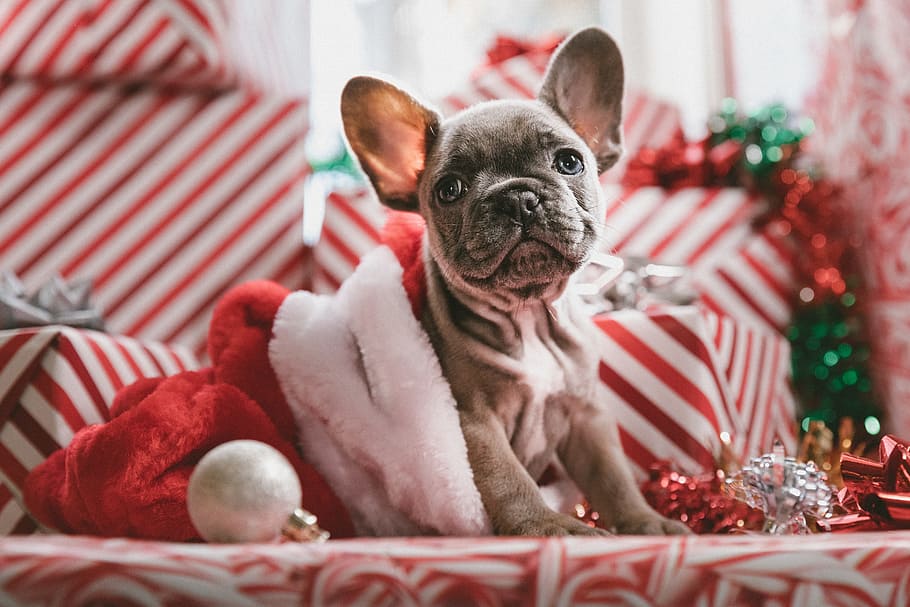Holidays Hazards for Pets

Holidays can be a wonderful time spent with loved ones and being grateful for everything we have received over the past year. However, there are some things to be aware of when holidays are in session. Our pets can become vulnerable to some holiday hazards and it is important to be knowledgeable and cautious about those risks so they can be avoided.
The smells of food fills the air and even though it might be tempting to give your pet a treat please remember that there are a lot of pet specific treats that are not harmful to your pet, but human treats can often be harmful for your pet.
“Chocolate is by far the most commonly ingested dangerous food around the holidays,” explains Dr. James Barr, clinical assistant professor in emergency and critical care at the Texas A&M College of Veterinary Medicine & Biomedical Sciences (CVM). “Chocolate and cocoas contain theobromine, a chemical highly toxic to dogs. Ingestion in small amounts can cause vomiting and diarrhea, but large amounts can cause seizures and heart arrhythmias, disorder of heart rate beating too fast or too slow.”
Barr says that alcohol toxicity is another frequent issue for pets around the holiday season. Affected animals can experience seizures, dangerous drops in blood sugar, blood pressure, and body temperature as well as respiratory failure.
“One should avoid foods containing grapes and raisins as they have been reported to cause kidney failure in dogs,” notes Barr. “Many sugarless gums and candies contain xylitol, which has a strange affect on dogs causing a massive insulin secretion and a dangerous, sometimes fatal, drop in blood sugar. One should also avoid fatty foods because this can cause severe inflammation of the pancreas known as pancreatitis, which can lead to abdominal pain, vomiting, and can occasionally result in death.”
It is also important to be careful when exposing plants to your pet. Some plants can be toxic to your pet, so make sure that all plants are out of their reach.
“Poinsettias have classically been thought of as toxic, but if ingested they only cause mild problems such as vomiting or diarrhea,” explains Barr. “The same is true for holly berries or mistletoe, although they are slightly more dangerous if large quantities are ingested. More concerning plants are any flower in the Lilly family because they can cause severe kidney failure in cats.”
Holidays would not be the same without decorations. So keep your pet in mind when choosing decorations, especially your Christmas tree.
“Both real and artificial trees pose hazards for pets,” says Barr. “The preservative for the water in the Christmas tree can contain ingredients such as bleach and vinegar which are caustic and can cause some gastrointestinal irritations. It is very important to keep pets away from drinking tree water.”
It may be best to a keep a Christmas tree in a stand where the water can be covered so pets don’t have the option to drink the water. Also, it is important to secure the tree with a fishing line string to a hook on the ceiling or wall to avoid it from falling over. Tree lights should not be plugged in when they are not being used so that your pet does not get tangled up in them. Pick up all tinsel, ribbon, ornaments, and hooks off of the floor so a pet does not mistake them for chew toys. Decorate the bottom of the Christmas tree with wood or plastic ornaments that won’t break in case a pet likes to get close to the tree. Keep all of the gifts that contain human food off the floor so pets are not tempted by the smells. Burn candles in places that are inaccessible to your pets. Barr points out that liquid potpourri can cause chemical burns to the mouth and esophagus which can be very painful and dangerous for any pet if ingested.
Lastly, please avoid giving pets as presents without consulting the receiver of the gift first. Animal shelters see an increase of donations directly after the holidays from short lived pet owners.
“While pets as presents may make for a popular parent, it is a well-known fact that shelter populations increase after the holidays as there are a lot of those pets that are surrendered because a family is unprepared for them,” explains Barr. “If you are considering a pet as a gift, use the opportunity to visit a shelter and adopt a deserving pet from there. It can be a wonderful opportunity where the giver and the receiver will gain a lot more from the experience.”
If you believe that your pet has ingested a toxic substance, please call: Pet Poison Helpline at 1-800-213-6680 or the ASPCA Animal Poison Control Center at 1-888-426-4435. As always, the Texas A&M University Small and Large Animal Hospitals are always open for animal emergencies 24 hours a day, 365 days a year.
Pet Talk is a service of the College of Veterinary Medicine & Biomedical Sciences, Texas A&M University. Stories can be viewed on the Web at vetmed.tamu.edu/news/pet-talk. Suggestions for future topics may be directed to editor@cvm.tamu.edu.


